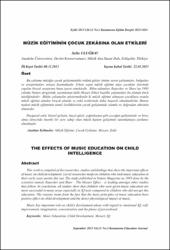Müzik eğitiminin çocuk zekâsına olan etkileri
Özet
Bu çalışma müziğin çocuk gelişimindeki rolünü gözler önüne seren çalışmaları, bulguları ve araştırmaları ortaya koymaktadır. Erken yaşta müzik eğitimi alan çocuklar üzerinde yapılan birçok araştırma buna işaret etmektedir. Bilim adamları Rauscher ve Shaw'un 1993 yılında Nature dergisinde yayımlanan ünlü Mozart Etkisi başlıklı çalışmaları bu alanda öncü niteliğindedir. Bütün çalışmalar göstermektedir ki müzik eğitimi almayan çocuklara oranla müzik eğitimi alanlar birçok alanda ve zekâ testlerinde daha başarılı olmaktadırlar. Bunun nedeni müzik eğitiminin temel özelliklerinin çocuk gelişiminde olumlu ve doğrudan etkisinin olmasıdır. Duygusal zekâ, kişisel gelişim, hayal gücü, yoğunlaşma gibi çocuğun gelişiminde ve birey olma sürecinde önemli bir yere sahip olan müzik kişinin gelişimini tanımlamaya yardımcı olmaktadır. This work is compiled of the researches, studies and findings that show the important effects of music on child development. Lot of researches made on children who took music education in their early years points this out. The study published in Nature Magazine on 1993 done by the scientists namely Rauscher and Shaw – The Mozart Effect – is leading amongst other studies that follow. In conclusion, all studies show that children who were given music education are more successful in many areas especially in IQ tests compared to children who did not get this education. The reasons stems from the fact that the basic principles of music education have positive effect on child development and the direct physiological impact of music. Music has important role on child's development phase with regard to emotional IQ, selfimprovement, imagination, concentration and the phase of personhood.
Kaynak
Kastamonu Üniversitesi Kastamonu Eğitim DergisiCilt
21Sayı
3Bağlantı
http://www.trdizin.gov.tr/publication/paper/detail/TVRVMU9EVTVPUT09https://hdl.handle.net/11421/12122


















